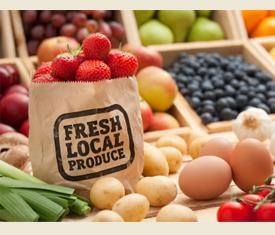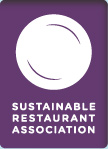
It can be a challenge for cookery schools to provide local food for its classes
The past few years have seen an increasing awareness among consumers of how food is produced and where it comes from, with a strong emphasis on organic, sustainable and locally sourced ingredients.
In response to this, the Sustainable Restaurant Association (SRA), which launched in 2010, has helped thousands of restaurants, pubs, cafés, hotels, takeaways and caterers give their customers what they’re looking for: “Good food that doesn’t cost the earth.” An SRA rated restaurant provides a guarantee of sound provenance, fair treatment of staff and even a “doggy bag for diners” who wish for one.
This rating is now available to cookery schools and Looking to Cook has teamed up with the SRA to add the Most Sustainable Cookery School Award to its Cookery School awards this year.
“We’re delighted to be judging the Sustainable Cookery School of the Year category,” says SRA’s managing director, Mark Linehan. “Any great chef will tell you that one of the most important lessons an aspiring cook can learn is about the provenance of the food they prepare – having a connection with their raw materials and truly valuing them.
“A cookery school worth its salt should source its ingredients as well as any restaurant, take responsibility for its impact on the environment and pass on that knowledge to its students.”
The key to this knowledge lies in supporting small suppliers with sustainable food systems, such as local farms. This is the way forward, says the SRA, if we want to avoid the negative impact of industrial farming and its effect on the environment due to pollution, degradation of soil – which can lead to erosion – and heavy reliance on fossil fuels.
Moreover, global industrial-scale meat production can often mean weak food safety standards and inadequate inspection procedures where less care is taken over processing, handling and preparation, which can mean that small amounts of contamination affect vast quantities of food.
In contrast, meat from local, sustainable farming practices is a lot healthier, with grass-fed beef higher in “good” cholesterol, vitamins A and E, lower in fat, and containing more antioxidants than factory farmed beef. There is little or no use of pesticides, antibiotics, and hormones, unlike with large-scale production, and minimal transport methods are not only kinder to the environment but result in fresher, tastier produce, as fruit and vegetables sourced locally can be harvested closer to peak ripeness.
Another benefit to communities is that locally produced food, distributed to nearby restaurants and cookery schools, increases trade, which can generate jobs and help stimulate the local economy.
Of course, there are schools in rural areas that rely partly on their own farms or kitchen gardens for ingredients. For instance, the Colstoun Cookery School is Scotland’s first sustainable, organic school, based in the grounds of Colstoun Estate, where a kitchen garden is used to grow vegetables. Wherever possible, they strive to source any additional produce locally.
Likewise, Jody Scheckter’s organic and biodynamic farm, Laverstoke Park in Hampshire, features an ultra-modern purpose-built cookery school that relies solely on the farm’s own fresh fruit, vegetables and plentiful supply of meat. They wear the motto, “Healthy Soil = Healthy Grass = Healthy Animals = Healthy Meat and Milk = Healthy People” with great pride.
This is no doubt what many schools aspire to but clearly there are difficulties for city schools where access to locally grown produce is less readily available. Many contacts are required for the sourcing of sustainable produce, which is often only guaranteed by opting for organic, which can prove costly and time-consuming, especially for a school simply striving to get up and running.
The exception proving the rule is Rosalind Rathouse’s Cookery School on Little Portland Street. Over 75 per cent of her school’s ingredients are organic and sourced locally; they work with local and national charities to raise awareness of sustainability and healthy eating, recycle all food waste, and the kitchen now runs on renewable energy.
It is also the only London school to be awarded by the SRA for its “exceptional and consistent approach towards sustainable practices”, achieving the maximum three stars after applying for an SRA rating online. Other schools keen to acquire this accolade, which the Sunday Times called the “Michelin Stars of Sustainability”, can do likewise and be proud of their ethical clout and happy in the knowledge they are totally on-trend.
 How can cookery schools enter for the Most Sustainable award?
How can cookery schools enter for the Most Sustainable award?
The SRA’s online rating system covers what they refer to as the three main pillars of sustainability: Sourcing, Environment and Society. Schools that register with the SRA can apply for this rating and this will provide entry into the Most Sustainable Cookery School Awards. The winner will be the cookery school that scores the highest rating. The prize is a year’s free membership of the SRA, which provides 12 months advice and support from their expert account management team. The two runners-up will receive six months free SRA membership. Any cookery school that completes the rating as part of the award will be entitled to a 20 per cent discount on SRA membership, so effectively everyone’s a winner!
